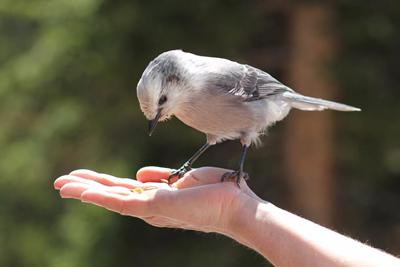Southampton biologist opens up the natural world during COVID-19 lockdown

While much of the world is experiencing some form of lockdown due to COVID-19, and human activity limiting the distance we can all travel, a University of Southampton academic has come up with a novel way to keep us all attuned to nature whilst stuck indoors.
Palaeontologist and evolutionary biologist, Dr Neil Gostling, has set up a Facebook page - ‘The Dinosaur on your windowsill’ – to help us stay connected with nature in a safe space. Surely dinosaurs are extinct? Not so, says Dr Gostling, who says that we all encounter dinosaurs every day from the comfort of our own homes.
“Everyone thinks that dinosaurs went extinct 66 million years ago - but they didn’t!” Neil enthused. “There’s one group that is still alive today - the birds - and they come into our gardens, hopefully, all of the time.
“And, with all of the current reduction in traffic, no airplanes in the sky and just a generally quieter time, if we all open a window or throw open the back door, there is this sound that we don’t often get to hear much these days and that’s birds singing in the trees which I think is really nice,” he continued.
“So I thought it would be an opportunity for us, in our enforced isolation, to actually engage a little bit with the wider world,” Neil said. “It sounds a little ironic or counter-intuitive that you can get out and engage with the world when you’re stuck in your garden but actually, I think we’ve got a really good opportunity here to do some back garden safari and understand a bit more about the natural world around us.”
To date, the Facebook page has attracted nearly 700 dedicated followers from around the world who share their own encounters with flora and fauna wherever they are based – from visiting deer wandering through the bushes to wood lice found amongst dead leaves and upturned stones.
The page also features ideas for games and other activities and provides a wide range of links sourced by contributors to help us all find greater enjoyment and benefits from the wildlife around us, including ideas and resources for parents who may be home-schooling their children.
For those living in flats or other homes where there are no garden spaces, Neil recommends a simple solution.
“You don’t have to have a back garden to go out and appreciate the natural world,” encouraged Neil. “If you’re up high, you might in fact be at eye level with sea gulls and you can see what they’re doing or you have a balcony or just a window you can put a bird feeder on your window and attract birds – actually living, flying dinosaurs – to you.
“There will also be little tiny bugs, arthropods and worms crawling around in window boxes on your windowsill or on a balcony in a flat,” he concluded. “And we’re quite lucky that this is all happening at this time of year because the world is changing so much as the plants and the animals are coming back; we’ve got birds migrating back, we’ve got flowers and plants, blossom on the tree, we’ve got trees opening up with their leaves as the world comes back to life again.”
Click here to visit ‘The Dinosaur on your Windowsill’ on Facebook. The page is private but anyone can make a request to join after answering a few questions.